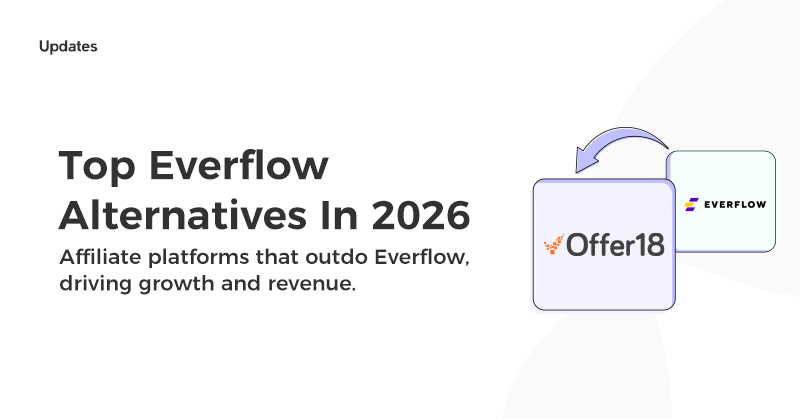Share
Affiliate marketing has revolutionized the marketing world by offering a performance-based approach that benefits both merchants and affiliates. At the core of this successful model lies an important element: conversion tracking in affiliate marketing. This important practice not only enables precise measurement of marketing efforts but also facilitates optimization, enhances ROI, and fosters trust. In this guide, we will delve into the importance of conversion tracking in affiliate marketing, exploring its mechanics, benefits, and practical applications.
What is Conversion Tracking?
Conversion tracking in affiliate marketing refers to the comprehensive process of monitoring and recording user actions that occur after they click on an affiliate link. These user actions, known as conversions, can encompass a wide range of activities depending on the goals of the affiliate program and the nature of the product or promoted service.
Understanding Conversions
Conversions can be broadly categorized into several types based on the desired outcomes of the marketing campaign. Common types of conversions include:
-
Purchases: This is the most straightforward type of conversion, where a user completes a transaction and buys a product or service. For e-commerce affiliates, tracking purchases is needed as it directly correlates with revenue generation.
-
Sign-ups: In many affiliate marketing campaigns, the goal might be to drive users to subscribe to a newsletter, start a free trial, or join a membership. These sign-ups are valuable because they help build a relationship with potential customers, who may eventually make a purchase.
-
Tracking downloads is necessary for: Affiliates promoting software, apps, or digital cossary. Each download signifies a user’s interest in the product, which can lead to further engagement or purchases.
-
Form Submissions: Many B2B affiliate programs aim to generate leads. In such cases, tracking form submissions on contact forms, quote requests, or information downloads can be critical for measuring success.
-
Clicks: Sometimes, simply clicking through to a specific page or piece of content counts as a conversion, especially when the affiliate’s role is to drive traffic rather than sales.
The main goal of conversion tracking is to collect detailed data on these conversions to assess the effectiveness of different marketing strategies and campaigns.
How Does Conversion Tracking Work?
Conversion tracking typically involves adding a small piece of code, called a tracking pixel or snippet, to the merchant’s website. When a user clicks an affiliate link and performs the desired action, the tracking pixel captures this event. This information is then relayed to the affiliate network or tracking platform, providing real-time data on the conversion. Here’s a step-by-step breakdown of the process:
-
Affiliate Link Generation: Affiliates receive unique tracking links from merchants or affiliate networks.
-
User Clicks Link: A potential customer clicks on the affiliate link, which redirects them to the merchant's site.
-
Tracking Pixel Activation: Upon the user's completion of a desired action (e.g., purchase), the tracking pixel embedded in the site captures this conversion.
-
Data Transmission: The pixel sends conversion data back to the affiliate network or tracking platform.
-
Reporting and Analysis: Affiliates and merchants can access detailed reports on conversions, facilitating performance evaluation and optimization.
The Multifaceted Benefits of Conversion Tracking
Conversion tracking offers numerous benefits that are needed for the success of affiliate marketing campaigns. Let's explore these benefits in greater detail:
Accurate Performance Measurement
Conversion tracking is indispensable for accurately measuring the performance of affiliate marketing efforts. By capturing data on every conversion, affiliates can determine which campaigns, strategies, and traffic sources yield the best results. This granular level of detail allows for precise performance assessment and informed decision-making.
-
Case Study: Measuring Performance
Consider an affiliate promoting a range of health supplements through various marketing channels, including blog posts, social media, and email newsletters. By implementing conversion tracking, the affiliate can pinpoint which channels and specific campaigns drive the most sales. They may discover that email newsletters generate a higher conversion rate compared to social media posts, prompting a strategic shift towards email marketing.
Campaign Optimization
Conversion tracking provides actionable insights that enable affiliates to optimize their campaigns effectively. By analyzing conversion data, affiliates can identify what is working and what isn't, allowing them to make necessary adjustments. This could involve reallocating the budget to high-performing ads, refining targeting parameters, or tweaking ad creatives.
-
Example: Optimizing Campaigns
Imagine an affiliate running multiple Google Ads campaigns for an online clothing store. Conversion tracking reveals that ads featuring summer dresses have a higher conversion rate when compared to ads for winter coats. The affiliate can then allocate the budget to the summer dress ads, ensuring a better return on investment.
Enhanced ROI Calculation
Return on investment (ROI) is a metric for evaluating the success of any marketing initiative. Conversion tracking in affiliate marketing allows affiliates and merchants to calculate ROI with precision by comparing the revenue generated from conversions to the costs incurred. This clear understanding enables marketers to grasp the financial impact of their efforts. By having accurate data on conversion-related revenue and associated costs, businesses can identify the most profitable campaigns and strategies. This clarity helps maximize profits and minimize wasted expenditure, ensuring that marketing resources are allocated efficiently and effectively.
-
Practical Application: Calculating ROI
Merchant partners with several affiliates to promote a new line of fitness equipment. By using conversion tracking, the merchant can determine which affiliates are delivering the highest ROI. Affiliates driving substantial revenue relative to their commission costs can be incentivized with higher commissions, fostering more productive partnerships.
Issue Identification and Resolution
Conversion tracking is instrumental in identifying and addressing issues that may hinder campaign performance. Whether it's a technical glitch, a poorly performing landing page, or misaligned audience targeting, tracking data can highlight problems, enabling swift corrective action.
-
Scenario: Identifying Issues
An affiliate notices a sudden decline in conversions for a particular campaign. By examining the conversion tracking data, I discovered that the landing page linked to the campaign is experiencing slow load times. Addressing this technical issue promptly helps restore the campaign's performance, ensuring minimal disruption.
Building Trust and Transparency
Trust and transparency are foundational elements of successful affiliate marketing relationships. Conversion tracking provides both affiliates and merchants with verifiable data on campaign performance. This transparency helps build stronger, more trusting partnerships, as both parties can see the tangible results of their efforts.
-
Fostering Trust
A merchant shares detailed conversion tracking reports with their affiliates, showcasing the effectiveness of the affiliates’ promotional activities. This transparency not only builds trust but also motivates affiliates to continue investing in high-quality marketing efforts.
Practical Steps to Implement Conversion Tracking
To fully take advantage of conversion tracking, it’s important to understand how to use it effectively. Properly implemented conversion tracking can provide valuable insights into your marketing efforts, helping you see which strategies are working and which aren’t. Understanding how to use conversion tracking to its fullest potential enables you to measure success accurately and optimize your campaigns for maximum effectiveness. Here are the key steps involved:
Choose a Reliable Tracking Platform
Selecting a reliable tracking platform is the first step in implementing conversion tracking. Popular platforms include Offer18, Google Analytics, Voluum, and AffiliateWP. These platforms offer robust tracking capabilities, detailed reporting, and user-friendly interfaces.
Generate Unique Affiliate Links
Affiliates need unique tracking links to monitor conversions accurately, and for that, you need the best affiliate link tracker. Affiliates usually provide these links, and they are generated using tracking software and affiliate software. Each link contains unique parameters that identify the affiliate and track user activity.
Place Tracking Pixels on Conversion Pages
Merchants must place tracking pixels or snippets on the conversion pages of their websites. For instance, if the desired conversion action is a purchase, the tracking pixel should be placed on the order confirmation page.
Test and Verify Tracking Setup
Before launching campaigns, it’s important to test and verify the tracking setup. Affiliates and merchants should conduct test conversions to make sure that the tracking pixels are firing correctly and that data is being accurately recorded.
Monitor and Analyze Data
Once conversion tracking is live, ongoing monitoring and analysis are a must. Affiliates need to frequently analyze performance reports, spot emerging trends and use data-driven insights to continuously refine and improve their campaigns.
Overcoming Common Challenges in Conversion Tracking
While conversion tracking offers numerous benefits, it also presents certain challenges. Here are some common issues and strategies to overcome them:
Data Accuracy
Ensuring data accuracy is a common challenge in conversion tracking. Data that is not accurate can lead to misguided decisions and wasted resources. To enhance data accuracy:
-
Regularly audit and test tracking setups.
-
Use multiple tracking methods (e.g., pixel tracking and server-to-server tracking) for redundancy.
-
Collaborate closely with merchants to guarantee proper implementation.
Privacy Concerns
With increasing privacy regulations (e.g., GDPR, CCPA), ensuring compliance while tracking conversions is of utmost importance. Affiliates and merchants must:
-
Obtain explicit user consent for tracking activities.
-
Implement robust data protection measures.
-
Stay updated on privacy laws and adjust tracking practices accordingly.
Attribution Issues
Attribution refers to the process of assigning credit for conversions to the appropriate marketing efforts. Inaccurate attribution can skew performance data. To address this:
-
Use advanced attribution models that consider multiple touchpoints (e.g., first-click, last-click, linear attribution).
-
Implement tools that provide comprehensive attribution insights.
Future Trends in Conversion Tracking
Conversion tracking is constantly evolving due to technological advancements and shifts in market dynamics. Here are some emerging trends to watch:
Enhanced Attribution Models
Future conversion tracking solutions will likely feature more sophisticated attribution models that provide a holistic view of the customer journey. These models will enable marketers to understand the impact of each touchpoint, leading to more informed decisions.
AI-Powered Insights
Artificial intelligence (AI) is set to revolutionize conversion tracking by offering predictive marketing data analytics and actionable insights. AI-powered tools can analyze huge amounts of data, identify patterns, and provide recommendations for optimizing campaigns.
Increased Focus on First-Party Data
With growing concerns over privacy and third-party cookie deprecation, there will be a greater emphasis on leveraging first-party data for conversion tracking. This shift will require affiliates and merchants to build stronger direct relationships with their audiences.
Conclusion
Conversion tracking is not just an advantageous tool—it is a core component for success. By accurately measuring performance, optimizing campaigns, enhancing ROI, identifying and addressing issues, and fostering trust and transparency, conversion tracking empowers affiliates and merchants to achieve their marketing goals.
Staying ahead requires continuous learning and adaptation. Implementing effective conversion tracking practices is a significant step towards building more successful and profitable affiliate marketing campaigns. If you still need to leverage conversion tracking in your affiliate marketing efforts, now is the time to start. The insights and benefits it provides will undoubtedly lead the ad to a more successful and profitable campaign.



